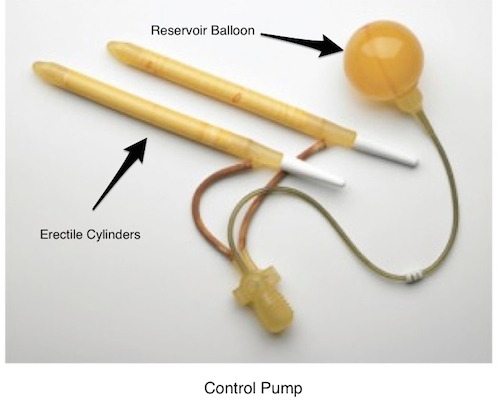
Penile Implant
What is a penile implant (prosthesis)?
A penile implant is a device that is surgically placed in your penis to allow you to get an erection. This device is usually used for men who have tried other erectile dysfunction (ED) treatments like oral medications, urethral suppositories, vacuum devices, or injection therapy without success.
There are two main types of implants:
- Inflatable implants: A reservoir of fluid, salt water, is placed in your abdomen and attached to inflatable cylinder tubes in your penis. A pump with a release valve is placed in your scrotum. You squeeze the pump to push the fluid into the cylinders to achieve an erection. Afterward, you release the valve to allow the fluid to go back to the reservoir. When deflated, the penis will have a normal flaccid appearance. This type is the most used.
- Semi-rigid rods: This implant stays rigid all the time. It is bent forward for sexual activity or bent up toward the body to hide it when not in use. This article does not talk about this type of implant. Talk to your urologist for more information.
How is the implant placed?
Penile implant placement is often done on an outpatient basis so that you can go home the same day. General (meaning you will be asleep) or spinal anesthesia (also called spinal block, used to block pain from the lower part of your body) is used. The surgery usually takes about 45-60 minutes. It is done through a small incision (cut) in the scrotum or just above your penis, depending on your case.
If there is bleeding, a small drain will be placed, and you may stay overnight. The drain is removed the next morning. In general:
- A dressing that applies pressure will be placed around your penis and scrotum for 24 hours. This can usually be removed the day after surgery. The stitches used to close the incision are absorbable, meaning they do not need to be removed and will go away on their own.
- Pain after surgery is often mild. You will be sent home with prescriptions for antibiotics, pain medication, and a stool softener.
- It is common to have some scrotal swelling and discomfort after surgery. This often goes away within one to two weeks.
- You should not lift anything heavier than 10 pounds and avoid exercising and sexual activity until 4-6 weeks after surgery.
- You may shower 48 hours after surgery. You should not bathe or submerge your penis in water for one to two weeks after surgery.
- If you have an inflatable implant, you will be taught how to use the pump. You may be given instructions to inflate and deflate the device for 15 minutes twice a day to help stretch the tissues and prevent capsule formation around the device.
What are the possible side effects of the procedure?
Penile implant surgery is usually very safe. Some of the side effects from the procedure (surgery) may include:
- Infection.
- Bleeding.
- Implant failure.
- Damage to the urethra that needs to be fixed with surgery.
- Pain, either with the device inflated or in the deflated position.
- In very rare cases, there can be damage to the bowel, bladder, or large blood vessels during the placement of the reservoir balloon.
When should I call my provider?
You should call your provider right away if you have any of the following symptoms after surgery:
- Severe pain.
- Fever.
- Discharge (drainage) or bleeding from the incision.
- Blood in the urine.
- Severe swelling.
What else should I consider?
Although the cylinders expand in length and width, the erection that you get with an implant is often smaller than your natural erection before having erectile dysfunction (ED). The erectile bodies in some men do not extend fully into the tip of the penis. This is a separate compartment that normally fills with blood in men who do not have ED. If the cylinders do not extend far enough into the tip of the penis, the head of the penis may "droop" somewhat with erections. This should not affect sexual activity.
An implant does not change the feeling on the skin of the penis. It does not affect the ability to reach orgasm or ejaculate. If your implant needs to be removed, you will likely need to have it replaced to have erections in the future.
OncoLink is designed for educational purposes only and is not engaged in rendering medical advice or professional services. The information provided through OncoLink should not be used for diagnosing or treating a health problem or a disease. It is not a substitute for professional care. If you have or suspect you may have a health problem or have questions or concerns about the medication that you have been prescribed, you should consult your health care provider.
Information Provided By: www.oncolink.org | © 2025 Trustees of The University of Pennsylvania
